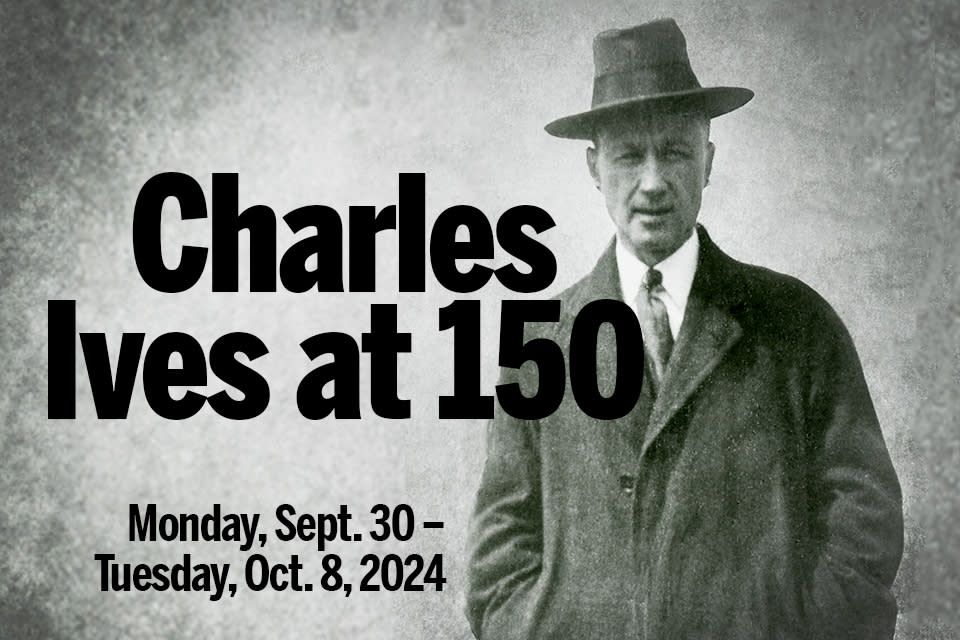Aaron Cain: I'm Aaron Cain for WFIU Arts. The IU Jacobs School of Music is hosting a sesquicentennial celebration of American composer Charles Ives, exploring his place in American history and culture. I asked one of the festival curators, eminent Ives Scholar Peter Burkholder, about what he's looking forward to in this ambitious festival.
Peter Burkholder: It's been over a year in planning, of course. So I'm also looking forward to when it's over [laughter] so I can get a week of sleep. So, it started as a long weekend and somehow it grew to be nine days long, as people volunteered. We have so many groups in the School of Music doing performances. This includes two of Ives’s Symphonies, all three of his piano sonatas, all four of his violin sonatas, both of his string quartets, innumerable songs, multiple piano music beyond that. So, just an enormous amount of an opportunity to hear Ives's music live. Some of these pieces are not played live all that often. Others are quite common. And the other thing that we wanted to do from the beginning was to integrate performance with the humanities more generally. So, we have the cooperation of scholars and departments across campus: comparative literature, art history. American studies, history, and English are all contributing scholars. And also, of course, we have many guests coming from other places. So the conversations are going to be really fun, I think, as well as the concerts.
Aaron Cain: What does this mean to you? You are an Ives scholar. I could be forgiven for calling you the Ives scholar. And this seems to be the ultimate one-stop shopping for anyone who wants to know anything, or indeed everything, about Charles Ives. So, what does this mean to you personally? That this has come together?
Peter Burkholder: That's a great question. First of all, I've always wanted to attend a festival like this. So it's the opportunity to put something together that I'd really like to be at. And I hope I get to go to some of it. I hope that there aren't so many last minute snafus and things to take care of that I'm off doing something instead of sitting there and listening. Hearing his music live is a wonderful, wonderful opportunity. And most of his music I've grown accustomed to in recordings. I don't know how many hours of music this is either, but it's an enormous amount. And it's music for a variety of media. Some of it is very much in romantic style. Some of it is kind of experimental. Much of it is immediately accessible. Some of it will be a little…”Oh? I never thought music could be like that.” [laughter]
Aaron Cain: This is a technical term, of course.
Peter Burkholder: And I like that variety. That's one of the things I really like about Ives. If you tell me what you like, I can find several Ives pieces that you will like. So he had very, very diverse tastes, and it's wonderful just to experience all of that back-to-back. And then we're inviting interesting people to come and give talks, because they're likely to say things that would never have occurred to me. For instance, during the Violin Sonata concert, Jeremy Denk is going to be offering some commentary. And every time I hear Jeremy Denk talk about music, I learned something that is new. The same is true of our historians Alan Lessoff and Allen Guelzo, on the Gilded Age and on the Civil War, respectively. Our art historian Tim Barringer and the other visitors, everybody is bringing perspectives that are new and different. And when we get going in conversations, I think it's going to be fascinating. So I think that's what it means to me, is that it's an opportunity to have a big party, listen to a lot of music. I've been at a couple Ives festivals before. I helped organize one at Bard College several years ago, and something happened to me in the middle of a concert that just made my entire life. Somebody came up to me and said, “Professor Burkholder, do you mind if I ask you a question about Charles Ives?” And it was like, “OK, this is what heaven must feel like.” So I'm hoping that lots and lots of people come up to me and say, “can I ask you a question about Ives?”
Aaron Cain: You've certainly created a good opportunity for folks to do so. Well, this sounds like a tremendous event, and congratulations on bringing it all together, and thanks for speaking with me today.
Peter Burkholder: It's a pleasure. I hope everybody who hears this comes and hears something.
Aaron Cain: Peter Burkholder, scholar and curator of Charles Ives at 150, taking place from September 30th through October 8th at the Jacobs School and including over two dozen concerts, panels and discussions. More information at music.indiana.edu. For WFIU Arts, I'm Aaron Cain.







